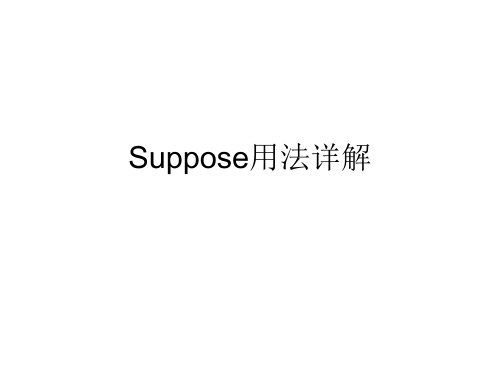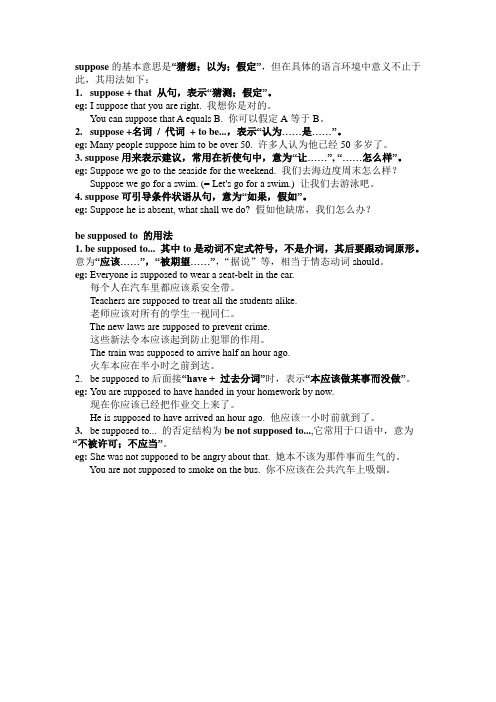suppose 用法的方方面面
suppose的用法 (2)

suppose的用法suppose是一个常见的动词,用于表示假设、设想和推测。
在英语中,suppose可以用于不同的情况和句型,具体用法如下:1. 表示假设suppose可以用于表达假设,即假定某种情形成立。
例如:•I suppose she will be here soon.(我想她很快就会来。
)•Let’s suppose, just for a minute, that we had all the money we wanted.(让我们假设,只是为了一分钟,我们有我们想要的所有钱。
)2. 表示推测suppose可以用于表示根据已有的信息或事实作出合理的推测。
例如:•They are running late. I suppose there must be traffic on the road.(他们迟到了。
我猜路上肯定有交通堵塞。
)•It’s been raining all day. I suppose the picnic will have to be canceled.(整天都在下雨。
我想野餐将不得不取消。
)3. 表示责备或怀疑suppose还可以用于表示对某人的责备、怀疑或猜测。
例如:•I suppose you forgot to lock the door.(我猜你忘记锁门了。
)•He is supposed to be the best in his field, but I don’t see anything special about him.(他应该是他领域中最好的,但我没有看出他有什么特别之处。
)4. 与句型搭配suppose还可以与一些特定的句型搭配使用,表达不同的含义。
以下是其中一些常见的句型:•suppose that + 句子:用于引导一个假设情况。
例如:Suppose that you won the lottery, what would youdo?•suppose (that) + 主语 + 动词:用于表达责备或怀疑。
suppose的用法

suppose的基本意思是“猜想;以为;假定”,但在具体的语言环境中意义不止于此,其用法如下:1.suppose + that 从句,表示“猜测;假定”。
eg: I suppose that you are right. 我想你是对的。
You can suppose that A equals B. 你可以假定A等于B。
2.suppose +名词/ 代词+ to be...,表示“认为……是……”。
eg: Many people suppose him to be over 50. 许多人认为他已经50多岁了。
3. suppose用来表示建议,常用在祈使句中,意为“让……”, “……怎么样”。
eg: Suppose we go to the seaside for the weekend. 我们去海边度周末怎么样?Suppose we go for a swim. (= Let's go for a swim.) 让我们去游泳吧。
4. suppose可引导条件状语从句,意为“如果,假如”。
eg: Suppose he is absent, what shall we do? 假如他缺席,我们怎么办?be supposed to 的用法1. be supposed to... 其中to是动词不定式符号,不是介词,其后要跟动词原形。
意为“应该……”,“被期望……”,“据说”等,相当于情态动词should。
eg: Everyone is supposed to wear a seat-belt in the car.每个人在汽车里都应该系安全带。
Teachers are supposed to treat all the students alike.老师应该对所有的学生一视同仁。
The new laws are supposed to prevent crime.这些新法令本应该起到防止犯罪的作用。
Suppose用法详解

一、关于否定转移 表示“想”、“认为”、“料想”等,后接否定的 宾语从句时通常将否定转移到主句上。如: I don’t suppose he is really ill. 我看他不是真病了。 I don’t suppose that he will come in time. 我看他不 会及时来的。 注意以下简略答语的使用: A:Will he win? 他会赢吗? B:I suppose so. 我想他会赢吧。 B:I don’t suppose so. [I suppose not. ] 我想他不会 赢。
二、关于词序 2. 注意以下正误句型的词序: 你认为他会去了哪里呢? 正:Where do you suppose he has gone? 误:Do you suppose where he has gone? 你认为是谁偷了这钱呢? 正:Who do you suppose has stolen the money? 误:Do you suppose who has stolen the money?
他们本来应该在一小时以前赶到这儿的。 正:They were supposed to be here an hour ago. 正:They are supposed to have been here an hour ago. What makes you suppose him to be connected with them? 你怎么会认为他与他们有联系呢? suppose+名词/代词+不定式,如: I supposed her to have already left for home. 我认为她已经动身回家了。
三、用于be supposed to 用于 be supposed to, 意为“应该”、“理应”,其后接动词原 形(有时为进行式或完成式)。如: You are supposed to be there before dark. 你应该在天黑前赶 到那儿。 He’s supposed to be doing his homework at home now. 他现在 应该在家里做作业。 He is supposed to have written us a letter. 他本来应该给我们 写封信的。 注:用于否定句,有时表示委婉地禁止,意为“不应当”、 “不可”、“不许”。如: You’re not supposed to smoke in here. 此地不准吸烟
suppose的用法总结

suppose的用法总结以下是小编为大家整理的Suppose的用法总结,希望能帮助大家更好地掌握suppose这个单词,提高英语水平。
一、Suppose做及物动词,意为“想,认为,猜想,料想”,用法如下:1.suppose后接that引导的宾语从句,that可以省略,如:I suppose we’ll go there next week.我猜想我们下周将去那儿。
2.suppose +名词/代词+[ (to be)+表语]宾语补足语,如:What makes you suppose him to be connected with them?你怎么会认为他与他们有联系呢?3.suppose+名词/代词+不定式,如:I supposed her to have already left for home.我认为她已经动身回家了。
4. suppose+名词/代词+名词(宾语补足语),如:I never supposed him a hero.我从来没有认为他是一个英雄。
5.suppose+名词/代词+形容词 (宾语补足语),如:We all suppose him clever.我们所有的人都认为他很聪明。
6. suppose+名词 /代词+介词短语,如:I supposed him in the office.我想他在办公室。
7. suppose做插入语,如:You don’t mind my smoking, I suppose.我想你不会介意我抽烟。
使用suppose时应注意:1. I suppose可以用来有礼貌地要求一个肯定的答复,如:I suppose (that) you are very busy just at the moment?我想你这会儿正忙吧?2. suppose, guess与imagine的区别:suppose多用于口语,是试探性的,但有一定的根据;guess随意性很强,缺乏依据;imagine指“设想”、“想象”与众所周知的事实相反的东西,强调虚构和幻想。
think用法小结

Suppose 的用法suppose 是及物动词,在实际运用中,常用来表示说话人的看法、猜测或提出假设。
为了帮助大家正确使用suppose 一词,现将其用法归纳如下:1.“sup p o se+(that)从句”,表示“猜测;认为”,若从句是否定形式,用法同 guess,think ,believe ,应将否定前移至主句。
如:I suppose (that)you are right .我想你是对的。
I don't suppose my friend can finish this work .我猜想我的朋友不能完成这项工作。
2.“sup p o se+名词/代词+介词短语”表示“猜测某人/某物在……”。
如:I supposed him in the classroom .我猜想他在教室里。
3.“sup p o se+名词/代词+动词不定式”表示“猜想某人做某事”。
如:I supposed her to be in the reading-room .我猜想她在阅览室。
All his neighbours supposed him to be a doctor .他的邻居都猜他是医生。
4.suppose 还可用于插入语中。
如:Y ou don't mind m y smoking ,I suppose .我想,您不会介意我吸烟吧。
Who do you suppose telephoned today ?你猜今天谁打过电话?5.be supposed to d o sth .表示“应该”、“应当”,是指根据规定或按照法律,人们不得不做的事,或期待将要发生的事。
如:Y ou're supposed t o s tart work at 8 o'clock every morning .你理应每天早晨 8 点开始工作。
Y ou aren't supposed t o t ake the b ooks out of the reading-room .你不该把这些书拿出阅览室。
Suppose的用法

Suppose的用法suppose是及物动词,常用来表示说话人的看法、猜测或假设。
为了帮助同学们正确使用suppose一词,笔者现将其用法归纳如下:1. be supposed to中的to是动词不定式符号,后接动词原形,主语为人时,表示“应该;被期望”,它可以用来表示劝告、建议、义务、责任等。
主语为物时,它表示“本应;本该”,用于表示某事本应该发生而没有发生。
它还可以用来表示“被认为是;被相信是”。
如:I am supposed to start work at 7:30 every morning. 我理应每天早晨7:30开始工作。
The students aren’t supposed to take the books out of the library. 学生不应该把这些书拿出图书馆。
The train was supposed to arrive ten minutes ago. 火车应该在十分钟之前到达。
They are supposed to be very clever. 人们认为他们很聪明。
2. “suppose + that从句”表示“猜测;认为”。
如:I suppose (that) he is right. 我想他是对的。
The teacher supposes (that) his students can’t finish this work. 老师猜想他的学生不能完成这项工作。
3. “suppose+名词/代词+介词短语”表示“猜测某人/某物在……”。
如:He supposed his friend in the library. 他猜想他的朋友在图书馆里。
4. “suppose+名词/代词+to be”表示“猜想某人……”。
如:She supposed her sister to be in the park. 她猜想她妹妹在公园。
I supposed the girl to be a teacher. 我猜这个女孩是位老师。
suppose的用法

suppose的基本意思是“猜想;以为;假定”,但在具体的语言环境中意义不止于此,其用法如下:1.suppose + that 从句,表示“猜测;假定”。
eg: I suppose that you are right. 我想你是对的。
You can suppose that A equals B. 你可以假定A等于B。
2.suppose +名词/ 代词+ to be...,表示“认为……是……”。
eg: Many people suppose him to be over 50. 许多人认为他已经50多岁了。
3. suppose用来表示建议,常用在祈使句中,意为“让……”, “……怎么样”。
eg: Suppose we go to the seaside for the weekend. 我们去海边度周末怎么样?Suppose we go for a swim. (= Let's go for a swim.) 让我们去游泳吧。
4. suppose可引导条件状语从句,意为“如果,假如”。
eg: Suppose he is absent, what shall we do? 假如他缺席,我们怎么办?be supposed to 的用法1. be supposed to... 其中to是动词不定式符号,不是介词,其后要跟动词原形。
意为“应该……”,“被期望……”,“据说”等,相当于情态动词should。
eg: Everyone is supposed to wear a seat-belt in the car.每个人在汽车里都应该系安全带。
Teachers are supposed to treat all the students alike.老师应该对所有的学生一视同仁。
The new laws are supposed to prevent crime.这些新法令本应该起到防止犯罪的作用。
suppose的用法总结

suppose的用法总结Suppose是一个十分常用的英语动词,它的意思是“假设、猜想或认为”,这个词在口语和书面使用中,都很常见。
那么,咱们应该如何正确使用suppose呢?下面就来总结一下suppose的用法。
首先,suppose是一个不及物动词,它只能单独使用,而不能和任何其他动词连用,例如“I suppose it is true.”,其中suppose 是一个独立的动词,不能和动词连用,不能说“I supposing it is true.”。
其次,suppose常用来表示“假设”,即“如果这样的话”的意思,此时,它常用来和一个虚拟条件句连用,而且此时它的后面要有if,语气上也要使用一般将来时。
例如:He is supposed to arrive at 8 oclock if he takes the plane.,表示他如果乘飞机的话,应该在8点钟到达。
再次,suppose也可以表示“猜想或认为”的意思,此时,它常用来和“that”连用,而且其后一般不要接虚拟条件句,语气上要使用肯定句,表示推测或暗示,例如:I suppose that she angry,表示我猜想她一定很生气。
此外,suppose也可以用来表示“让某人做某事”,此时,它后面可以用一般现在时,也可以用“to do”的形式,例如:I suppose you to do this kind of work,表示我让你去做这样的工作。
最后,suppose也可以用来表示“估计”的意思,此时,它后面一般可以接数字、频率或概率,例如:I suppose the temperatureoutside is about thirty degrees,表示我估计外面的温度大约是三十度。
总结起suppose的用法,主要有以下几点:1、suppose是一个不及物动词,它不能和任何其他动词连用。
2、suppose可以用来表示“假设”,此时要和if连用,语气上使用的是一般将来时。
- 1、下载文档前请自行甄别文档内容的完整性,平台不提供额外的编辑、内容补充、找答案等附加服务。
- 2、"仅部分预览"的文档,不可在线预览部分如存在完整性等问题,可反馈申请退款(可完整预览的文档不适用该条件!)。
- 3、如文档侵犯您的权益,请联系客服反馈,我们会尽快为您处理(人工客服工作时间:9:00-18:30)。
suppose 用法的方方面面
一、关于否定转移
表示“想”、“认为”、“料想”等,后接否定的宾语从句时通常将否定转移到主句上。
如:
I don’t suppose he is really ill. 我看他不是真病了。
I don’t suppose that he will come in time. 我看他不会及时来的。
注意以下简略答语的使用:
A:Will he win? 他会赢吗?
B:I suppose so. 我想他会赢吧。
B:I don’t suppose so. [I suppose not. ] 我想他不会赢。
二、关于词序
2.注意以下正误句型的词序:
你认为他会去了哪里呢?
正:Where do you suppose he has gone?
误:Do you suppose where he has gone?
你认为是谁偷了这钱呢?
正:Who do you suppose has stolen the money?
误:Do you suppose who has stolen the money?
三、用于be supposed to
用于be supposed to, 意为“应该”、“理应”,其后接动词原形(有时为进行式或完成式)。
如:
You are supposed to be there before dark. 你应该在天黑前赶到那儿。
He’s supposed to be doing his homework at home now. 他现在应该在家里做作业。
He is supposed to have written us a letter. 他本来应该给我们写封信的。
注:用于否定句,有时表示委婉地禁止,意为“不应当”、“不可”、“不许”。
如:
Y ou’re not supposed to smoke in here. 此地不准吸烟。
另外请比较:
他们本来应该在一小时以前赶到这儿的。
正:They were supposed to be here an hour ago.
正:They are supposed to have been here an hour ago.
四、用作连词
用来表示条件(相当于连词if),意为“假设”,也可用-ing的形式,若语气不肯定,有时还可用虚拟语气。
试比较:
假若他不来,那我们怎么办?
正:Suppose [Supposing] he is absent, what shall we do?
正:Suppose [Supposing] he was absent, what should we do?
五、表示建议
用来表示建议,意为“……吧”、“……怎么样”,后接从句时可用现在时态或过去时态,相比之下用过去时语气更委婉。
如:
Suppose we have [had] a rest. 我们休息一会儿吧。
Suppose we start [started] tomorrow. 我们明天动身吧。
